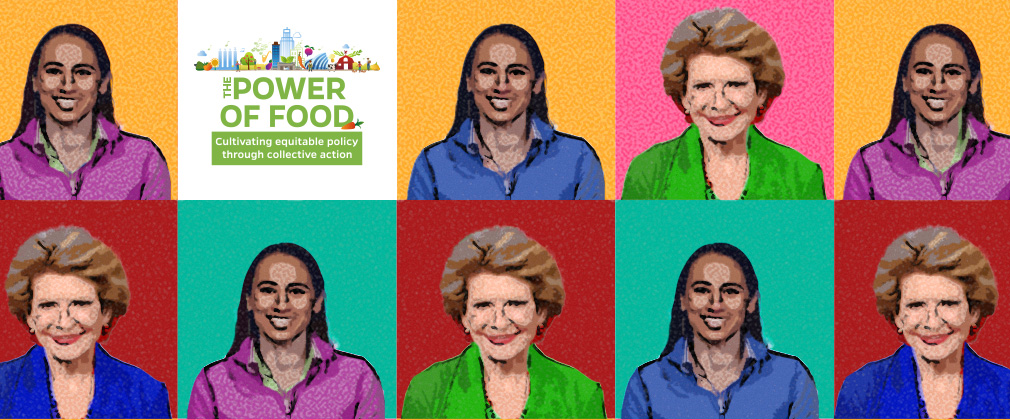Food Councils Convene Nationally to Transform Food Systems
BALTIMORE—October 14, 2021. As the first-ever Power of Food Forum kicked off its second day, US Sen. Debbie Stabenow (D-MI) extended a special welcome to the forum’s 500-plus participants. As part of her welcome, she named some of the many ways that food policy councils are making progress toward transforming the food system. Some of the efforts mentioned included growing food sovereignty, preserving native foodways, expanding resources to urban agriculture, recruiting diverse producers, and creating jobs. She also acknowledged the enormous challenges to the food system created by the COVID-19 pandemic and thanked food policy councils for their herculean feats tackling food insecurity caused by the food pandemic.
“You and your networks stepped up to keep local food economies afloat,” said Stabenow. “And you made sure the COVID aid packages work to build resilience, protect farmworkers, and upgrade our food infrastructures.” US Rep. Sharice Davids (D–KS) closed the event by offering encouragement to the councils. “The work that you’re doing on the ground in your communities—and in the ground—it’s really important to keep up those efforts,” she said.
The three-day virtual forum focused on “cultivating equitable policy through collective action.” Collective action is at the heart of what food policy councils (FPCs) do. Most councils in the US are local, regional, statewide, or tribal, and bring together as many diverse stakeholders as possible—from residents to businesses to government agencies to the nonprofit sector—to make the food system work for their communities. During the Covid-19 pandemic, food council work ran the gamut from finding new market outlets for farmers to working with policymakers to make sure food assistance benefits were as accessible as possible, and connecting families with sources of free, nutritious meals.
Most of the nearly 100 forum speakers hailed from food policy councils and shared stories and lessons learned from their own networks. They represented councils operating in cities, rural areas and tribal nations across the United States. At the heart of the forum were inquiries into how best to center racial equity and justice in the work that FPCs do, while continuing to meet immediate needs and sustain efforts to address systemic problems.
Natasha Frost, senior staff attorney at Public Health Law Center, attended the conference and said: “What will continue to be built, well past this conference, remains to be seen. But the connective threads and relationships are unfolding as I watch. I will be taking specific action and reaching out to some of the presenters based on your conference.”
Some of the forum’s “conversation catalysts” and “deep dives” addressed sensitive topics, such as allyship, intersectionality, gentrification (a concern associated with urban agriculture) and how councils might attempt to address the rural-urban divide. Other conversations took a nuts-and-bolts approach, discussing tactics that have proven successful for initiatives such as preserving land for cultivation by indigenous communities and facilitating the purchase of cropland for New Americans who come to this country with skills and knowledge but not capital.
In conversations about intersectionality and allyship, a Lilla Watson quote was invoked: “If you have come to help me, you are wasting your time. But if you have come because your liberation is bound up with mine, then let us work together.” Allyship was discussed as the “consistent and arduous practice of unlearning and re-evaluating, in which a person in a position of privilege and power seeks to operate in solidarity with a marginalized group.” Intersectionality extends far beyond food systems work, the speakers said. In order to make progress in the food system, work must also touch issues such as transit, housing, child care, incarceration, and more—and direct funding toward solving them.
In conversations about bridging the rural-urban divide, panelists had frank discussions about distrust between communities, and how distrust increased dramatically during the Trump Administration and continues to grow. Restorative justice is one approach to bridging the gaps, as is identity-based caucusing, which was important during the 1960s civil rights movement, but all approaches, said the speakers, must begin with a willingness to listen closely. Critical to this work is understanding what makes people feel safe—and unsafe—and being willing to discern what people are really asking for when they complain.
US Representative Sharice Davids (D–KS) helped to close the forum as she commended food policy councils for their work dealing with the new landscape of food policy during and after the pandemic. “Your perspective helps me understand the problems and priorities facing our food systems so that we can continue to make policy that meets the moment,” she said.
“While the delta variant prevented us from being together in person,” said Karen Bassarab, a senior program officer at the Center, “we hope this gathering provided a space for people to learn, listen and contribute and we hope to keep them engaged as we plan the next steps for the Food Policy Networks project.”
The forum also featured meditations, spoken word readings, and a Kansas City jazz-fusion band performance. Holistic wellness clinicians were available to help with stress, release, and reflection, as well.
More information about the forum:
The Power of Food Forum was an online forum that took place from September 20 to 22, 2021. The Forum was developed to create a space that welcomed a diverse group of participants to learn, share and collaborate; provide opportunities for skill-building, sharing resources and networking with other councils; identify opportunities for changing food policy at local, state, regional, tribal and federal levels, and; raise awareness about the value of food policy councils.
